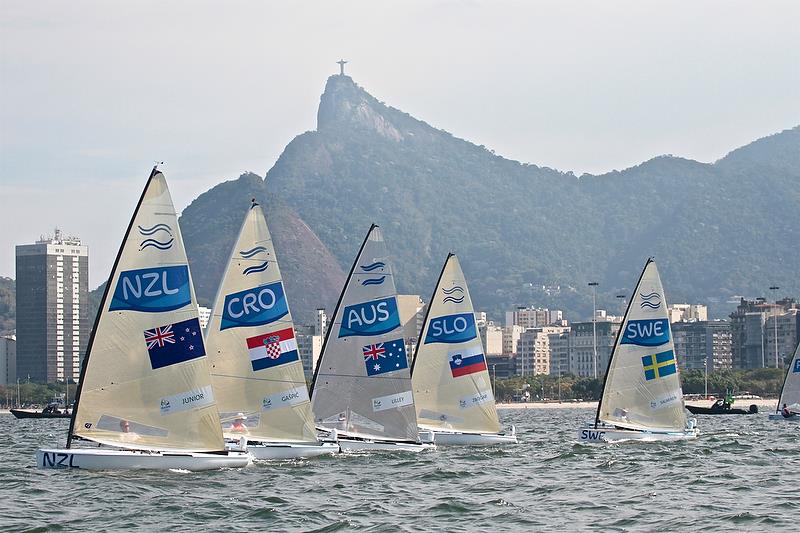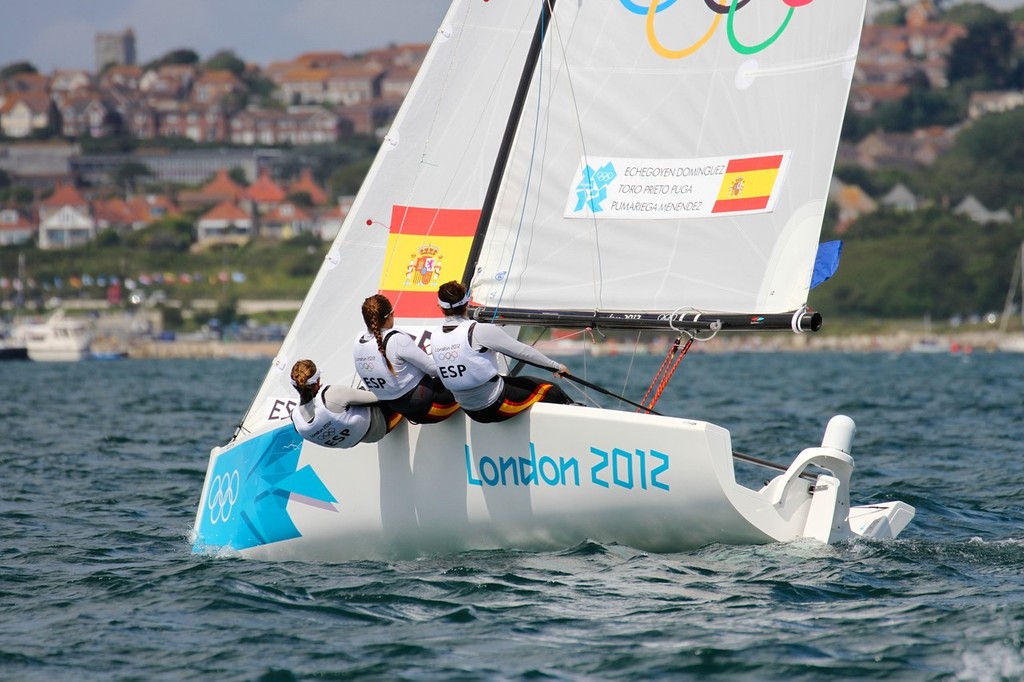
World Sailing put under legal microscope over Olympic choices
by Richard Gladwell/Sail-World.com/nz 7 Feb 2019 12:58 PST
8 February 2019

Even Christ the Redeemer couldn't save the Finn's Olympic continuance beyond 2020 © Richard Gladwell
Using reports, mostly from Sail-World NZ, but also from World Sailing's own documents, an authoritative sport-legal website/newsletter "LawinSport.com" has analysed the legal arguments proffered by World Sailing in its response to the ongoing European Commission anti-trust investigation.
World Sailing has been consistent in stating that it has sound legal advice for its actions and position in regard to the selection of Olympic classes, and particularly the builder licencing models for classes it has selected for Olympic competition. World Sailing maintains that its actions have been within EU Commission regulations.
Three reports from Sail-World are quoted in the introductory background to the article, published earlier this week, and authored by two specialist sports lawyers.
The EU Commission's investigation is confined only to Olympic classes.
World Sailing's choice of Olympic classes is the lawyers' focus as athletes wishing to compete in the Olympic Sailing Regatta are obliged to purchase the chosen classes, or in Olympic-speak, the Equipment specified for those Events.
Authors of the article, Alex Haffner and Thomas Edwards state: "The principal allegation is that World Sailings rules breach Article 101(1) of the Treaty on the Functioning of the European Union (TFEU), which prohibits agreements between companies which prevent, restrict or distort competition in the EU and which may affect trade between Member States."
Alex Haffner is a Partner in the Commercial, Sports and IP Team at London based firm Fladgate LLP, specialising in the sports, technology and media sectors. Thomas Edwards is a trainee solicitor in the sports business group of the same law firm.
They looked at two legal test cases against which the EU Commission investigators will measure World Sailing's actions.
The first case establishes that sporting bodies are indeed subject to EU Competition rules. The legal team then looks at World Sailing's strongest legal argument which is "that having standard equipment for all means the best sailor wins. This is perhaps a strong argument for World Sailing, who would contend that the winner of an Olympic event should be decided based on sailing skill, and not the quality of their equipment."
However, the authors note "this argument does suffer when other Olympic sports (like cycling) allow competitors to choose or make their own equipment, and yet those sports remain competitive. In addition, one could argue that technical innovation in the equipment is actually part of the sporting process, and that the best equipment and machinery should play a part, as long as it complies with strict technical regulations. Therefore, whilst this is a legitimate and reasonable objective for World Sailing, it is vulnerable to the idea that they could achieve this aim in other ways."
"There is no evidence to suggest the old [licenced builder] system for the sport did not work, and that competitors should be free to choose the different components of their boat, provided that it complies with strict technical regulations. It is worth pointing out and comparing sailing with other Olympic sports (such as cycling). Cycling does not specify the exact bike that competitors must use, provided it complies with the specifications. Whilst this has led to some arguments that the nations which can spend more money on the equipment have dominated the event, it has not led to the sport being undermined, and cycling still remains a popular Olympic sport."
The article also sets out the process to be followed by the EU Commission, noting that the investigation is in its early days (but is still an active investigation).
"The EU will carry out an initial investigation in which they gather as many facts as possible and submit questionnaires to customers of Class manufacturers and other suppliers. At the end of the initial investigative phase, the Commission can take the decision to pursue the case as a matter of priority and to conduct an in-depth investigation, or to close it."
The article focuses on defences and claims made by World Sailing, however it does not extend its scope to consider the history of selection of single manufacturer one-design classes for the Olympics, which has been ongoing over 25 years.
The history is that since November 1992, when the Int Laser class was selected, World Sailing and its predecessors the International Yacht Racing Union and International Sailing Federation have shifted away from a system of specifying a set of measurement rules for an Olympic class, to which the world body has authorised multiple licenced builders. That same system was applied to all international classes, some of which were selected from time to time to become Olympic equipment in accordance with World Sailing's Regulations.
The licenced builder mould was first broken with the selection of Windglider for the new windsurfing event in the 1984 Olympics, and reinforced with the selection of the Laser, as a mens singlehander for the 1996 Olympics. All equipment for the Laser at that stage was controlled by Performance Sailcraft. However, the hulls were built by three builders licenced by Performance Sailcraft, rather than the International Sailing Federation.
That single manufacturer one design model was generally followed with the introduction of the 49er for the 2000 Olympics, the 49erFX in 2016, the RS:X Windsurfer in 2008, and Nacra 17 multihull in 2016. The last Olympic class to be selected under the proven IYRU/ISAF licenced builder model as Olympic Equipment was the Yngling used in the 2004 and 2008 for the women's fleet racing keelboat. But that too was dropped in favour of the Elliott 6metre for the new 2012 Womens Matchracing event, which lasted just one Olympic regatta.
 www.photosport.co.nz"
www.photosport.co.nz" />
The Elliott6 was specially developed for the new Womens Match racing event at the Weymouth 2012 Olympic Regatta and was immediately dropped by ISAF - photo © Richard Gladwell
www.photosport.co.nz
With the selection of the Nacra 17 multihull, the single manufacturer one design model was continued, and it seems a similar approach will be followed with the proposed offshore keelboat event for the 2024 Olympic Sailing Regatta in Marseille.
Also beyond the scope of the article is the issue of Gender Equality which has driven much of the program of change within the 2024 Olympic Event and Equipment decisions.
The dropping of the Finn class from the 2024 Olympic regatta, has been the collateral damage of World Sailing's Gender Equality policy.
Currently the 470 as the only remaining multiple licensed builder equipment/class. However, under World Sailing regulations that too is subject to review and trials as the Men's and Women's Two Person Dinghy has been dropped for the 2024 Olympics and a new Mixed Two Person Dinghy substituted for which new equipment trials must be held in which the 470 is expected to be a participant.
Also out of scope is World Sailing's preference for "activation" around Olympic class selection. In simple English "activation" means consideration of marketing and revenue generation activities around the selection of Olympic Events and Equipment and other initiatives. Activation opportunities are much more difficult to achieve under the licenced builder model, and are restricted to the creation and promotion of World Sailing owned events, like the Sailing World Cup, Youth Worlds and combined Olympic classes world championship held every four years.
For the full article plus references and authorities click here
For a more detailed look at why sports federations [not specifically about Sailing] are under increasing scrutiny from competition authorities was published by LawInSport.com in December 2017 click here